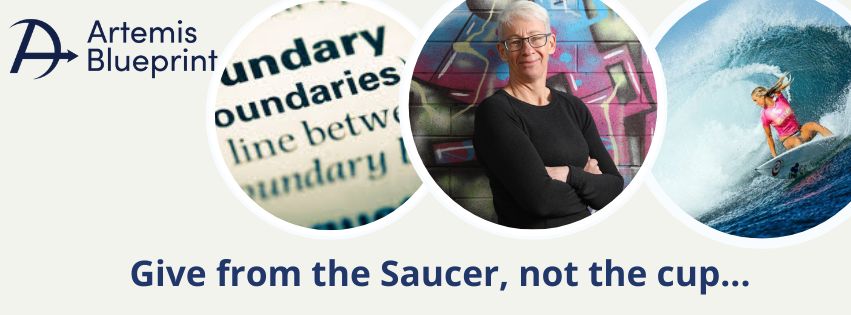Self-sacrifice often feels like the ultimate virtue. You give your time, energy, and love selflessly to those around you, right? But what happens when you give too much? When your cup—your inner reservoir of emotional and physical energy—is drained dry, leaving you exhausted, frustrated, and maybe even resentful?
Here’s the hard truth: giving at the expense of your well-being is not sustainable. In fact, it can harm both you and the people you’re trying to help. This is where the idea of “giving from the saucer, not the cup” comes in—a powerful metaphor for creating a healthier, more balanced way of being generous.
Let’s explore why self-sacrifice can be problematic, how empathy exhaustion is a real thing, and why learning to value yourself is the key to authentic generosity. Plus, we’ll dive into the science-backed benefits of setting boundaries and three takeaways to help you create a life where giving feels good—not draining.
The Problem with Self-Sacrifice
Self-sacrifice often starts with the best intentions. You want to help others, show empathy, and make a difference. But over time, constantly putting others first can take a toll on your mental, emotional, and physical health.
For example, let’s talk about over-volunteerism. Imagine being the go-to person for every committee at work, every fundraiser at your child’s school, and every family crisis. You feel obligated to say yes because you don’t want to let anyone down. But soon, your calendar is packed, your energy is depleted, and you barely have time to breathe.
Then there’s empathy exhaustion. If you’re someone who feels deeply for others (hello, empath!), you may find yourself absorbing the emotional weight of everyone else’s problems. Over time, this can lead to burnout, making it hard to function—not to mention impossible to offer meaningful support.
When you sacrifice too much, your giving stops being effective. You might feel resentful, overwhelmed, or even detached. And that’s not generosity; that’s self-neglect.
The Power of Giving from the Saucer
So, what does it mean to give from the saucer? Imagine your energy and well-being as a teacup. When your cup is full, it overflows into the saucer beneath it. Giving from the saucer means sharing the overflow—your abundance—rather than dipping into your already limited resources.
Giving from the saucer allows you to be generous without depleting yourself. It’s not selfish; it’s sustainable. And the key to achieving this state is personal investment.
Investing in Yourself: Filling Your Cup
Investing in yourself isn’t indulgent; it’s essential. Whether it’s carving out time for rest, setting boundaries, or pursuing personal goals, these acts of self-care ensure your cup stays full.
Science backs this up. A study published in Health Psychology found that people who regularly engage in self-care activities have lower stress levels, better emotional resilience, and greater capacity for empathy. In other words, the more you take care of yourself, the better you can show up for others.
Listening to Yourself
One of the biggest reasons people fall into the trap of self-sacrifice is ignoring their own needs. You might push through exhaustion or suppress feelings of frustration because you think your needs are less important than others’.
But here’s the thing: your needs matter. Listening to yourself—whether it’s recognizing when you’re tired, setting limits, or saying no—isn’t selfish. It’s a way of respecting your own humanity.
Valuing Yourself
Self-sacrifice often stems from the belief that your worth is tied to how much you give. But generosity isn’t about martyrdom; it’s about reciprocity. Healthy relationships involve give-and-take, where both parties feel valued and supported.
For example, if you’re always the friend who shows up for others but no one shows up for you, it’s time to reassess those dynamics. Valuing yourself means expecting the same respect and care that you offer to others.
Real-Life Examples of the Drain
Let’s put this into perspective with a few examples:
- Over-Volunteerism at Work: You’re asked to organize the office holiday party—again. You’re already swamped with deadlines, but you say yes because “no one else will do it.” By the time the party rolls around, you’re exhausted, resentful, and unable to enjoy the celebration.
- Empathy Exhaustion in Caregiving: You’re helping a friend through a tough time, which turns into daily venting sessions. You’re happy to help at first, but eventually, you feel emotionally drained and find yourself avoiding their calls.
- Family Overload: You’re the family problem-solver, always stepping in to manage conflicts or take care of aging relatives. But now, you’re so busy taking care of everyone else that your own needs have been sidelined.
The Science of Balanced Giving
Research shows that balanced generosity—not self-sacrifice—is the most sustainable way to give. A 2023 study in Frontiers in Psychology found that people who practice “reciprocal altruism” (giving in a way that allows for mutual benefit) experience greater life satisfaction and lower rates of burnout compared to those who give without boundaries.
Key Takeaways
- Fill Your Cup First: Taking care of yourself isn’t selfish—it’s the foundation of sustainable generosity. Prioritize self-care, rest, and personal goals so that your giving comes from a place of abundance.
- Set Boundaries: Saying no isn’t unkind; it’s necessary. Whether it’s declining extra responsibilities at work or limiting emotionally taxing conversations, boundaries protect your energy and ensure your generosity is intentional.
- Value Reciprocity: Healthy relationships involve give-and-take. Surround yourself with people who value and respect you, and don’t be afraid to expect the same care you offer others.
The Bottom Line
True generosity isn’t about running yourself ragged to meet everyone else’s needs. It’s about giving from a place of abundance, where your own well-being is intact. When you invest in yourself, listen to your needs, and value your worth, you create a life where generosity feels good—for both you and those you help.
So, next time you’re tempted to overextend yourself, ask: Is my cup full? If not, it’s time to pause, refill, and give from the saucer instead. You—and the people you care about—deserve it.
Cindy x

